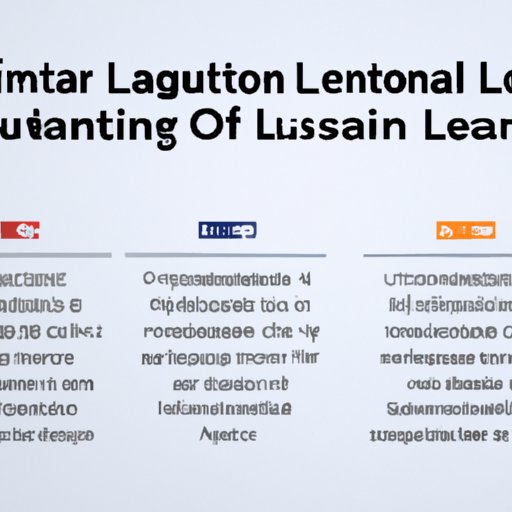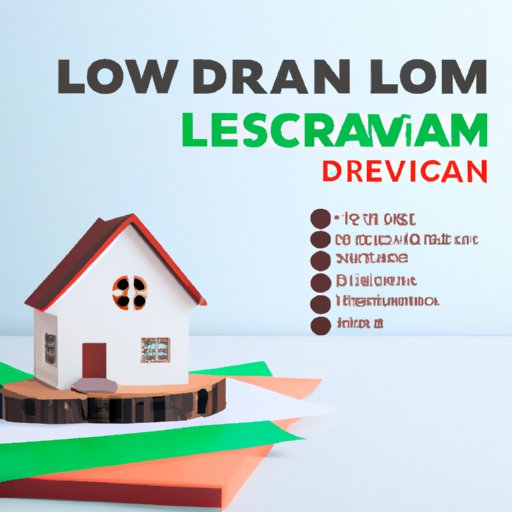Introduction
When it comes to taking out a loan, one of the most important questions to answer is: “How much loan can I qualify for?” Knowing your maximum loan amount can help you determine how much money you can borrow and what type of loan is best for you. In this article, we’ll provide an overview of the factors that affect your maximum loan amount, as well as tips for maximizing your loan eligibility.

Calculating Your Maximum Loan Amount: A Guide to Estimating How Much You Can Borrow
Understanding how much loan you can qualify for requires knowledge of the various factors that lenders consider when determining your loan eligibility. These include your credit score, debt-to-income ratio, employment history, and down payment. Let’s take a closer look at each of these factors and how they can affect your maximum loan amount.
Factors That Affect Your Maximum Loan Amount
Your credit score is one of the most important factors in determining your loan eligibility. Generally speaking, the higher your credit score, the more loan you can qualify for. The same goes for your debt-to-income ratio, which is a measure of how much of your monthly income is going toward paying off debts. The lower your debt-to-income ratio, the more loan you can qualify for. Your employment history is also taken into consideration, as lenders want to make sure you have a steady source of income to pay back the loan. Finally, the amount of your down payment can affect how much loan you can qualify for. Generally speaking, the larger the down payment, the more loan you can qualify for.
Steps for Calculating Your Maximum Loan Amount
To calculate your maximum loan amount, start by gathering all the documents you need to prove your creditworthiness and income. This includes copies of your tax returns, bank statements, and other financial documents. Then, use a loan calculator to estimate your maximum loan amount based on your creditworthiness and income. Make sure to factor in any additional costs associated with the loan, such as closing costs, interest rates, and other fees. Once you have an estimate of your maximum loan amount, you can begin exploring different loan options to find one that best fits your needs.

Tips for Maximizing Your Loan Eligibility
If you want to increase your chances of getting approved for a loan, there are a few things you can do to maximize your loan eligibility. First, try to pay down any existing debt you may have. This will help lower your debt-to-income ratio and improve your credit score. Second, work on improving your credit score by making all your payments on time and avoiding opening new lines of credit. Third, consider making a larger down payment if possible. This will show lenders that you are serious about repaying the loan and can help you qualify for a larger loan amount.
What Factors Determine How Much Loan You Can Qualify For?
The primary factors that determine how much loan you can qualify for are your credit score, debt-to-income ratio, employment history, and down payment. Your credit score is a measure of your creditworthiness and reflects your ability to repay a loan. Your debt-to-income ratio is a measure of how much of your monthly income is going toward paying off debts. Your employment history shows that you have a steady source of income to repay the loan. Finally, the amount of your down payment can affect your loan eligibility. Generally speaking, the higher your credit score, the lower your debt-to-income ratio, and the larger your down payment, the more loan you can qualify for.
Understanding Your Debt-to-Income Ratio and How it Affects Your Loan Amount
Your debt-to-income ratio (DTI) is an important factor in determining your loan eligibility. It is calculated by dividing your total monthly debt payments by your gross monthly income. Generally speaking, the lower your DTI, the better your chances of getting approved for a loan. If your DTI is too high, lenders may be hesitant to approve your loan, as it indicates that you are carrying too much debt relative to your income.

Exploring Different Types of Loans and Their Maximum Qualifying Limits
Different types of loans have different maximum qualifying limits. For example, conventional mortgages typically have a maximum loan amount of $417,000, while FHA loans have a maximum loan amount of $271,050. VA loans have a maximum loan amount of $424,100, and USDA loans have a maximum loan amount of $510,400. Keep in mind that these maximum loan amounts vary depending on where you live and the type of property you are looking to purchase.
Strategies for Increasing Your Chances of Loan Approval
If you’re looking to increase your chances of getting approved for a loan, there are a few strategies you can use. First, work on improving your credit score. This can help you qualify for a larger loan amount and better terms. Second, consider increasing your down payment. This can also help you qualify for a larger loan amount and better terms. Finally, try to reduce your debt-to-income ratio. This can show lenders that you are financially responsible and have the ability to repay the loan.

Consulting a Professional to Help You Determine Your Loan Eligibility
If you’re unsure of how much loan you can qualify for, it’s a good idea to consult a professional. A professional loan officer can help you understand the loan process and give you advice on how to maximize your loan eligibility. They can also answer any questions you may have and provide guidance on which type of loan is best for your situation. When consulting a professional, make sure to ask them about their experience and qualifications, as well as any fees they may charge for their services.
Conclusion
Figuring out how much loan you can qualify for is an important part of the loan process. To get an accurate estimate of your maximum loan amount, you’ll need to factor in your credit score, debt-to-income ratio, employment history, and down payment. Additionally, you should explore different types of loans to find one that best fits your needs. Finally, consulting a professional loan officer can be beneficial in helping you determine your loan eligibility and maximize your chances of loan approval.
Summary of the Article
This article provided an overview of the factors that affect your maximum loan amount, as well as tips for maximizing your loan eligibility. We discussed how your credit score, debt-to-income ratio, employment history, and down payment can affect your loan eligibility. We also explored different types of loans and their maximum qualifying limits, and provided strategies for increasing your chances of loan approval. Finally, we discussed the benefits of consulting a professional loan officer to help you determine your loan eligibility.
Final Thoughts on How Much Loan You Can Qualify For
Knowing how much loan you can qualify for is essential when it comes to taking out a loan. To get an accurate estimate of your maximum loan amount, you’ll need to factor in your credit score, debt-to-income ratio, employment history, and down payment. Additionally, you should explore different types of loans to find one that best fits your needs. Finally, consulting a professional loan officer can be beneficial in helping you determine your loan eligibility and maximize your chances of loan approval.
(Note: Is this article not meeting your expectations? Do you have knowledge or insights to share? Unlock new opportunities and expand your reach by joining our authors team. Click Registration to join us and share your expertise with our readers.)
